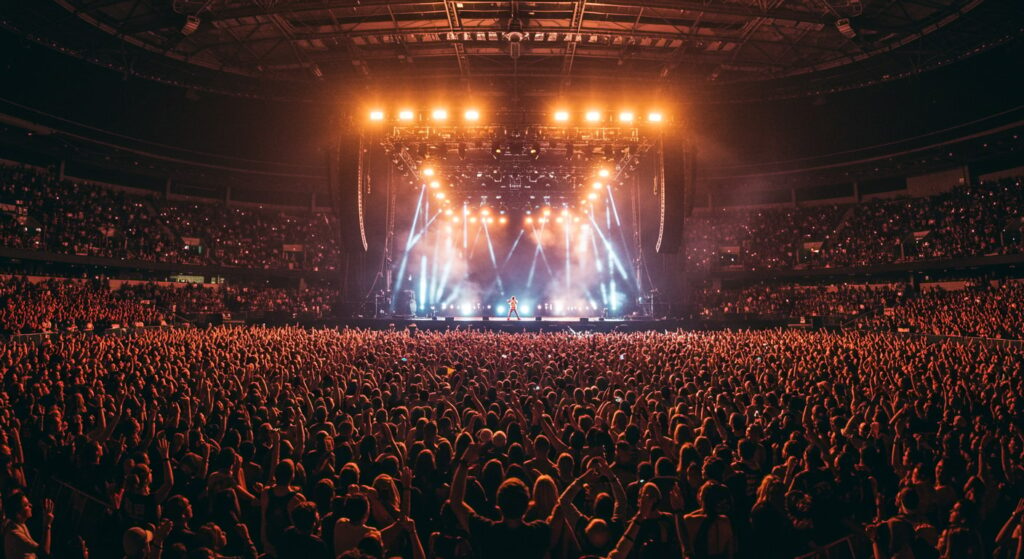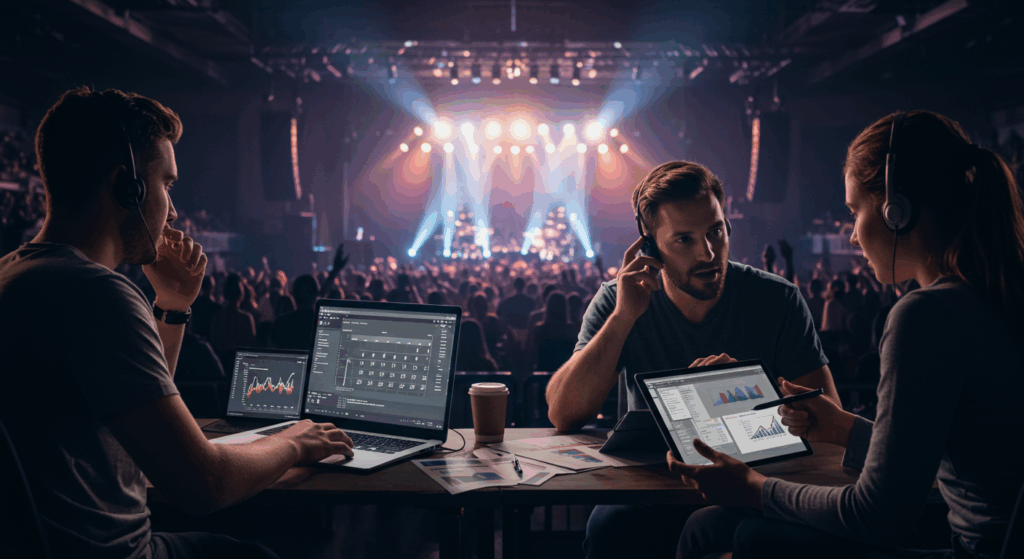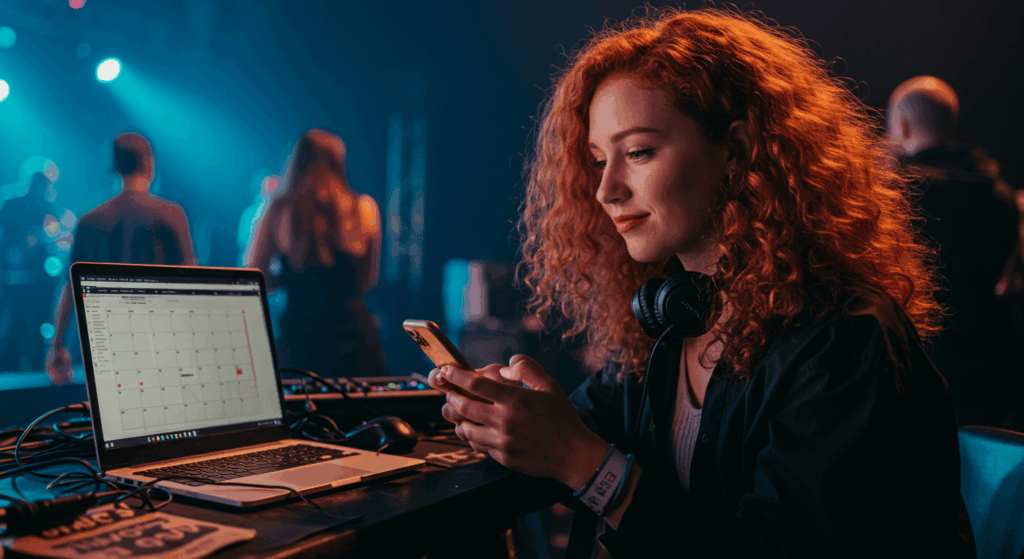
What to Expect from the Concert and Event Promotion Industry in 2025
The concert and event promotion industry has been on a steady climb, defying challenges and adapting to new trends. In terms of market size, revenue has achieved an average annual growth rate of 4.2%, with a 2.6% increase in 2024 alone, pushing total earnings to an impressive $56 billion.
This momentum signals not just recovery but expansion, as demand for live experiences remains strong despite economic uncertainties. Fans are willing to invest in unforgettable moments, driving ticket sales, VIP experiences, and hybrid event innovations.
But staying ahead is about leveraging technology, adapting to shifting consumer behaviors, and navigating an industry that’s never static. The next phase of growth will belong to those who embrace automation, real-time data, and smarter event planning. As 2025 unfolds, the key to success will be operational efficiency, dynamic pricing strategies, and an understanding of how to create premium experiences that keep audiences coming back for more.
Tech-Savvy Takeover: AI and Data Analytics Redefine Event Promotion
The concert and event promotion industry is moving beyond intuition and gut feelings—data-driven decision-making is now the competitive advantage. Advanced AI-powered market research tools help event promoters predict demand, optimize pricing, and even anticipate audience preferences based on past behavior. Whether it’s a music concert, sporting event, or corporate gathering, AI enables promoters to fine-tune their marketing strategies and maximize revenue.
Ticket pricing is one of the biggest areas seeing an AI-driven shift. Dynamic pricing models, powered by real-time market dynamics, adjust ticket prices based on demand, age group preferences, and competitor trends. Live music business professionals who use these tools can better operate venues, drive ticket sales, and boost overall industry revenue without the guesswork.
In 2025, event promotion is about leveraging technology to ensure every decision is backed by a detailed analysis that leads to higher profitability and smoother operations.
Hybrid Hype: Blending Virtual and Live Experiences for Maximum Impact
In the live music business, hybrid events are here to stay. While fans still crave the energy of live performances, digital platforms are expanding audience reach and revenue streams.
Streaming technology, AI-driven market research, and interactive VR experiences are allowing event promoters to monetize live music events beyond the physical venue. Whether it’s music festivals, sporting events, or corporate events, hybrid models create new opportunities for engagement and ticketing flexibility.
Adapting to this trend boosts market growth by catering to different audience segments. Some fans want the front-row experience, while others prefer premium virtual access with backstage content and exclusive artist interactions. By integrating hybrid event promotion strategies, promoters can optimize ticket sales, create new revenue sources, and adapt to evolving industry trends.
Success means giving audiences the ability to engage with live shows in ways that fit their lifestyles while maximizing profits.
Sustainable Sounds: Eco-Friendly Practices Take Center Stage
Sustainability is a driving force shaping the concert and event promotion industry. Fans, artists, and event promoters alike are demanding greener live music events, pushing venues and festivals to adopt eco-conscious operations. From eliminating single-use plastics to investing in carbon offset programs, sustainability is becoming a competitive advantage for those who embrace it.
Major players like Live Nation and Anschutz Entertainment Group are setting the tone with large-scale green initiatives, but smaller promoters and independent venue operators are also finding innovative ways to reduce waste and energy consumption.
Beyond environmental responsibility, going green is a smart marketing strategy. Sponsors and corporate event organizers are prioritizing partnerships with sustainable brands, and audiences are showing increased loyalty to popular events that align with their values.
Consider sourcing local food vendors, utilizing solar-powered stages, or optimizing travel logistics for touring artists to adopt sustainability for an ethical and financial win. Event promotion success is about minimizing environmental impact while maximizing long-term market share.
Personalization Power Play: Tailoring Experiences to Diverse Age Groups
One-size-fits-all is dead. In 2025, concert and event promotion success hinges on customization—giving fans exactly what they want, when they want it. Attendees expect experiences tailored to their preferences, whether that means VIP seating, exclusive meet-and-greets, or flexible ticketing options that cater to different age groups and budgets. Market research and data analytics play a huge role in understanding these audience segments, helping event promoters craft offerings that drive engagement and ticket sales.
For those managing live events, leveraging digital platforms is the key to making personalization seamless. With real-time data tracking, event promoters can analyze audience demographics, monitor spending behavior, and adjust marketing strategies accordingly.
Whether you’re targeting Gen Z festival-goers or corporate clients looking for premium experiences, using technology to tailor every aspect of the event experience ensures higher engagement, stronger brand loyalty, and greater industry revenue.
Monopoly Meltdown: Navigating the Shifting Landscape of Ticket Sales
The grip of major ticketing companies is loosening. Increased scrutiny on industry giants has pushed regulators to crack down on ticket prices, hidden fees, and exclusive contracts. As legislation forces more transparency in ticket sales, event promoters and theater owners have a chance to rethink their strategies. Alternative platforms and direct-to-fan sales models are gaining traction, giving venues and promoters more control over pricing, revenue sources, and customer relationships.
For those in concert event promotion, adaptability is key. Tracking real-time market dynamics, optimizing ticket sales with smarter pricing models, and integrating digital platforms that streamline transactions can give independent promoters a competitive advantage. Success will favor those who leverage new sales channels and pricing strategies to maximize industry revenue while keeping fans engaged.
Mega Events, Massive Expectations: The Rise of Supersized Concerts
Bigger is better in 2025. Live music events are scaling up, with artists pushing for stadium tours, multi-day music festivals, and high-production spectacles that go beyond the traditional concert and event experience. Fans are willing to pay premium ticket prices for immersive performances, and event promoters are responding by investing in larger venues, cutting-edge stage designs, and high-end VIP packages.
Managing these large-scale productions requires precision. Real-time data tracking helps promoters monitor ticket sales, optimize pricing, and coordinate logistics across multiple venues. Advanced event promotion industry tools make it easier to effectively navigate complex schedules, staffing needs, and vendor management.
As demand for blockbuster live performances grows, those who can scale efficiently while maintaining seamless operations will dominate the market share.
Regulatory Reboot: Compliance and Transparency in Event Promotion
New rules are shaking up the event promotion industry, and there’s no room for outdated practices. Stricter regulations now demand upfront disclosure of all ticket prices and fees, forcing event promoters and theater owners to rethink their pricing strategies.
With increased oversight on live music events, professionals must stay compliant. The smartest players are using digital platforms to automate compliance, track financials, and ensure transparency, avoiding fines while building trust with fans and stakeholders.
Social Media Surge: Platforms Like TikTok Transform Music Discovery
Social media is the new front row. Platforms like TikTok and Instagram are driving live music business trends, turning unknown artists into headliners overnight.
Viral moments dictate ticket sales, and event promoters who tap into these trends gain a massive competitive advantage. The key? Real-time market research, smart ad targeting, and integrating digital platforms to track engagement and convert online buzz into packed venues. Those who master the art of social-driven event promotion will dominate the market share in 2025.
Economic Resilience: Thriving Amid Financial Fluctuations
Even with economic uncertainty, live music events continue to thrive. Demand for concerts, festivals, and theater performances remains strong, but shifting consumer spending means event promoters must stay agile. While some fans are cutting back, others are willing to pay more for premium experiences, creating new revenue sources through VIP packages, dynamic ticket pricing, and exclusive add-ons.
To stay profitable, promoters need real-time market research and smarter financial planning. Tracking ticket sales, optimizing booking talent, and using digital platforms to streamline budgeting can mean the difference between surviving and thriving. Those who adapt to market trends and use data to drive decisions will be the ones leading the event promotion industry forward.
The Competitive Edge: Leveraging Innovative Tools in Event Promotion
Success in the concert and event promotion industry is about running smarter, faster, and more efficiently. The best promoters are using data-driven decision-making, automation, and digital platforms to stay ahead. From optimizing ticket sales to streamlining operations, those who embrace technology will dominate in 2025.
At Prism, we know what it takes to succeed because we’ve been in the trenches. Our all-in-one platform eliminates the chaos of outdated systems, giving event promoters, venue operators, and agencies the tools to manage bookings, track financials, and analyze market trends—all in one place. Whether you’re scaling up live events, refining marketing strategies, or maximizing revenue sources, we help you work smarter, not harder. Get started today and take control of your future in live music events.

Matt Ford is the founder and CEO of Prism.fm, an Austin-based software company revolutionizing live music event management. With a background in entrepreneurship and a degree from the University of Wisconsin-Madison School of Business, Ford combined his self-taught coding skills with firsthand experience as a concert promoter to address the inefficiencies he observed in the industry. In 2018, he launched Prism.fm, an all-in-one platform designed to streamline operations for venues, promoters, and agencies by replacing cumbersome spreadsheets with integrated tools for booking, financial tracking, and contract management. Under his leadership, Prism.fm has grown significantly, achieving $3 million in annual recurring revenue post-COVID and securing over $15 million in funding . Ford’s commitment to building user-centric solutions has positioned Prism.fm as a trusted partner for over 1,500 venues and promoters worldwide.


